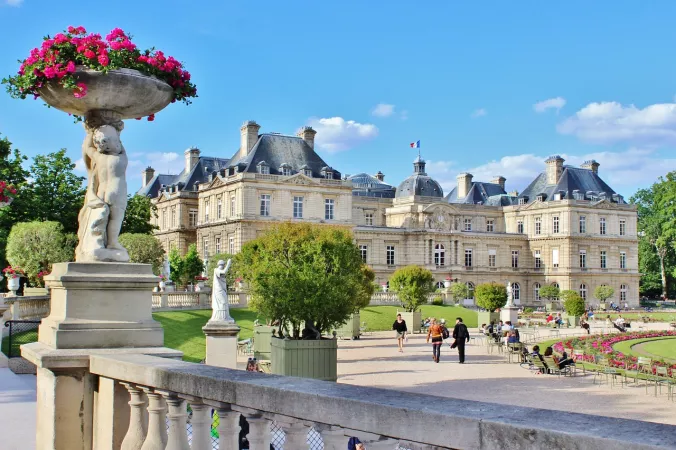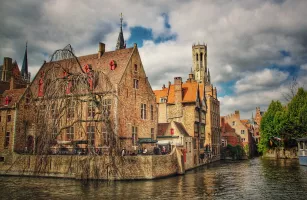
Luxembourg
Duration
2 to 4 Days
2 to 4 Days
Best time to visit
May-Jun, Sep
May-Jun, Sep
Theme
Heritage
Heritage
Luxembourg Travel Guide
Luxembourg, a small European country surrounded by Belgium, France, and Germany, is known for its picturesque villages, medieval castles, and stunning natural landscapes. With a rich history as a strategic fortress, Luxembourg offers a unique blend of cultures and traditions. The country's beautiful landscapes, including the Ardennes Forest and the Moselle River Valley, make it a popular destination for outdoor enthusiasts. Luxembourg City, the capital, is a UNESCO World Heritage site known for its stunning architecture and vibrant cultural scene.Top Attractions in Luxembourg
1. Luxembourg City 2. Vianden Castle 3. Mullerthal Trail 4. Bock Casemates 5. Moselle Wine RegionLuxembourg is Famous for
Luxembourg is famous for its medieval castles, rolling hills, and charming villages.Top Attractions in Luxembourg
- Luxembourg City - Vianden Castle - Mullerthal Trail - Bock Casemates - Moselle Wine RegionWhat's Great about Travelling to Luxembourg?
- Rich history and culture - Stunning natural landscapes - Charming villages - Safe and welcoming environmentWhat's Not So Great about Travelling to Luxembourg?
- Expensive destination - Limited public transportation options - Small size may not appeal to those seeking a bustling city experienceTravel Tips for Luxembourg
- Check visa requirements before travel - Renting a car is a convenient way to explore the country - Be prepared for varying weather conditions - English is widely spoken, but knowing a few words in Luxembourgish is appreciated by localsImportant Luxembourg trip information
- Ideal Duration: A week is ideal to explore the main attractions.
- Best Time to Visit: The spring and summer months for pleasant weather.
- Nearby Airports and Railway Stations: Luxembourg Airport and Luxembourg Railway Station serve as major entry points.
Total
5,84,000
*EXCLUDING APPLICABLE TAXES 5.0 Ratings
( 20 Reviews )
( 20 Reviews )
FAQ's on Luxembourg
Q1: What is the best time to visit Luxembourg?
The best time to visit Luxembourg is during the summer months from June to August when the weather is pleasant for outdoor activities and sightseeing. However, spring (April to May) and autumn (September to October) also offer mild temperatures and beautiful foliage. Winter (December to February) can be cold but charming, especially during the holiday season. Consider visiting during events like the Echternach Dancing Procession in June or the Christmas markets in December for a unique experience.
Q2: Do I need a visa to travel to Luxembourg?
As a member of the Schengen Area, Luxembourg allows visa-free travel for up to 90 days for visitors from many countries, including the US, Canada, Australia, and the EU. However, it is essential to check specific visa requirements based on your nationality. Make sure your passport is valid for at least three months beyond your planned departure date from Luxembourg. For longer stays or other purposes like work or study, you may need a visa.
Q3: What are the must-visit attractions in Luxembourg?
Luxembourg offers a mix of historical, cultural, and natural attractions. Don't miss the UNESCO-listed Old Town of Luxembourg City with its fortifications, the Grand Ducal Palace, and the Bock Casemates. Explore the picturesque village of Vianden with its stunning castle, visit the Mullerthal region known as "Little Switzerland," and wander through the charming town of Echternach. Nature lovers can enjoy the Ardennes region for outdoor activities like hiking and cycling. For a unique experience, visit the Schengen village where the Schengen Agreement was signed.
Q4: Is Luxembourg a safe place to travel?
Luxembourg is considered one of the safest countries in the world with low crime rates. However, like any destination, travelers should exercise basic precautions such as safeguarding valuables and being aware of their surroundings, especially in crowded tourist areas. Avoid walking alone in poorly lit areas at night and be cautious in urban areas known for pickpocketing. Overall, Luxembourg is a safe and welcoming country for tourists.
Q5: What is the local currency in Luxembourg and can I use credit cards?
The official currency of Luxembourg is the Euro (EUR). Credit cards are widely accepted in hotels, restaurants, shops, and tourist attractions. ATMs are also readily available in major cities and towns for cash withdrawals. It is advisable to inform your bank about your travel plans to avoid any issues with card usage abroad. While credit cards are convenient, it's good to have some cash on hand for smaller purchases or in case you visit places that may not accept cards.
Q6: What is the local cuisine like in Luxembourg?
Luxembourg's cuisine is influenced by French, German, and Belgian flavors, offering a diverse culinary experience. Try traditional dishes like Judd mat Gaardebounen (smoked pork neck with broad beans), Friture de la Moselle (fried small river fish), and Gromperekichelcher (potato fritters). Cheese lovers can savor varieties like Kachkéis and Rieslingspaschtéit. Don't miss out on the local wines and craft beers that pair well with Luxembourgish cuisine. Vegetarian and international food options are also available in restaurants across the country, catering to different dietary preferences.
Q7: What transportation options are available in Luxembourg?
Luxembourg has a well-connected transportation system that includes buses, trains, trams, and taxis. The public transport network is efficient and covers most parts of the country, making it easy to explore even remote areas. The national railway company, CFL, operates trains connecting major cities like Luxembourg City, Esch-sur-Alzette, and Ettelbruck. Buses are the primary mode of transport within cities and towns, with reliable schedules and routes. Taxis are also available but can be relatively expensive. For more flexibility, car rental services are accessible at airports and in urban centers for those who prefer to drive around the country.
Q8: Are there any cultural norms or etiquette I should be aware of when visiting Luxembourg?
When visiting Luxembourg, it's essential to respect local customs and etiquette. Greetings are typically formal, with handshakes being the common way to greet someone. Punctuality is valued, so it's polite to arrive on time for appointments or social gatherings. When dining out, it is customary to wait for the host to say "Prost" (cheers) before starting a meal. Dress modestly when visiting religious sites or attending formal events. Public behavior is expected to be polite and considerate, with a focus on maintaining personal space. Learning a few words in Luxembourgish, such as greetings or simple phrases, can also show respect for the local language and culture.
Q9: I am a travel agent. How can I buy travel leads of Luxembourg?
Register yourself as a travel agent at agents.tripclap.com and then you can buy travel leads to Luxembourg once your account is approved. For more details contact our support team at +91-8069186564 or support@tripclap.com

